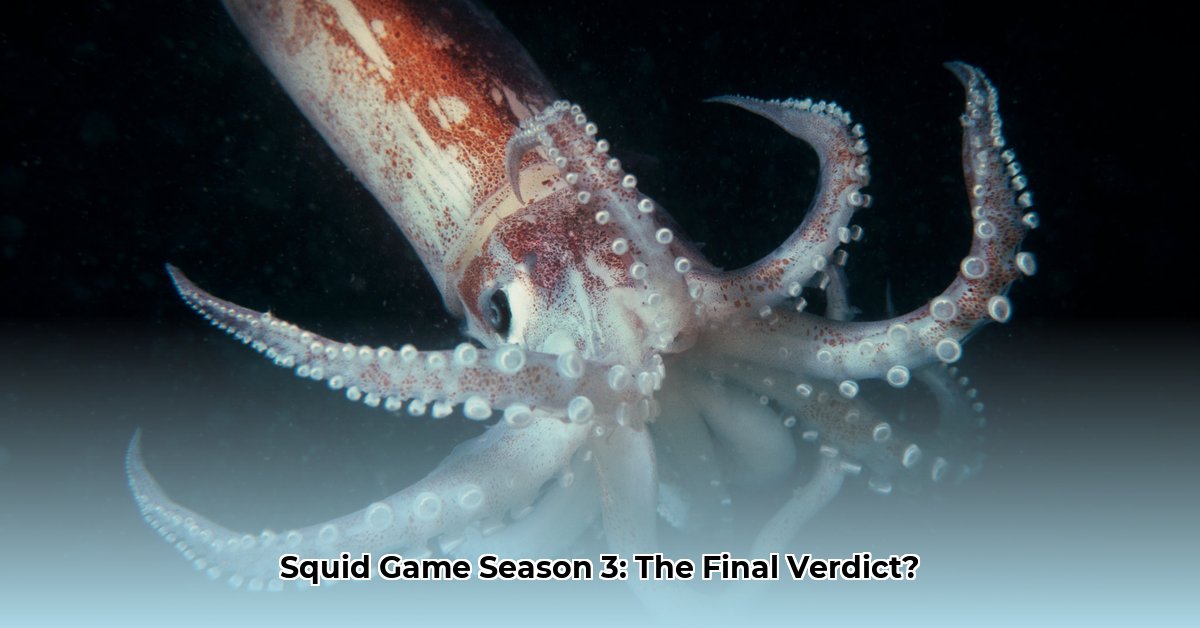
The Final Gamble: Gi-hun's Quest for Revenge
Squid Game Season 3 is finally here, and the anticipation was almost unbearable. Following the cliffhanger ending of Season 2, we're plunged once more into the brutal world of deadly children's games, this time focusing intensely on Gi-hun's relentless pursuit of revenge against the shadowy figures pulling the strings. But, did this highly anticipated season deliver the knockout punch fans were desperately hoping for, or did it stumble at the final hurdle? The truth, as with most things in life, is far more nuanced.
Gi-hun's Descent: A Deeper Look at the Protagonist
This season is a deep dive into Gi-hun's psyche. We witness his struggles, the trauma he carries, and the devastating impact the games have had on his life. The emotional weight is palpable, drawing the viewer into his turmoil. His transformation from desperate gambler to vengeful warrior is compelling, but did this relentless focus on his internal struggle ultimately enhance the narrative, or detract from the wider scope of the show? This is a question that divides critics and fans alike. "The emotional core of Season 3 is undoubtedly Gi-hun's journey," says Dr. Lee Chae-rin, Professor of Media Studies at Seoul National University. "However, the intensity of his focus, while emotionally powerful, might have overshadowed other crucial plot elements."
Did the show manage to maintain the deft balance between high-stakes action and meaningful social commentary that defined its earlier seasons? This season's narrative, while intense, felt somewhat uneven in places. Was it a fair trade-off for the emotional rollercoaster?
New Faces, Familiar Dangers: Expanding the Game's Universe
This season introduces several new characters, each adding their own unique flavour to the already intoxicatingly macabre landscape of the Squid Game. While some, like the unnervingly creepy Chul-su, leave a lasting impression, others – the return of Young-hee, for instance – prompt varied reactions, evoking a mix of nostalgia, unease and even a dash of amusement. These additions inject new energy into the proceedings, but do they fundamentally improve the overall experience? Then there's the further exploration of the Front Man's past – a welcome addition for some, but a distraction for others. Did it add sufficient depth, or merely cloud the essence of the narrative? One thing is for certain: the season, despite comprising only six episodes, manages to pack in an impressive amount of action and intrigue, leaving viewers breathless until the very last moment.
Pacing and Character Development: A Critical Appraisal
The critical response to the season's pacing has been mixed. While the high-stakes tension remains captivating, some viewers felt certain plotlines were rushed, sacrificing depth for speed. Others noted a perceived decline in the quality of character development, compared to the emotional resonance achieved in previous seasons. That signature Squid Game blend of social commentary and edge-of-your-seat suspense is still present, but it's arguably less balanced this time around. Did the makers of Squid Game keep their plates spinning in this final season? This season's pacing has been a hot topic of debate, with some praising the breathless tension, and others critiquing its lack of depth.
Did they maintain the emotional connection with the characters that defined the earlier seasons? This question hangs heavy in the air, dividing opinions and sparking heated discussions online.
Global Impact: More Than Just a Streaming Phenomenon
Squid Game's influence extends far beyond the viewing numbers Netflix will be scrutinising. Its international success has had a significant impact on the global landscape of Korean dramas and streaming content as a whole. It has inspired numerous imitations, conversations and critical analyses, solidifying its place in cultural history. Its worldwide popularity has undeniably changed the way we think about storytelling and streaming series. Professor Kim Jin-soo of Yonsei University's Department of Film Studies, notes, “The show's impact isn’t simply about its viewership; it's fundamentally altered the way the world perceives Korean television and its ability to connect with a global audience.”
How to Analyze Squid Game Season 3’s Ending and its Impact: A Step-by-Step Guide
Key Takeaways:
- The Season 3 finale provided a divisive, yet impactful conclusion.
- Critical reviews highlight both the emotional depth and the perceived decline in the show's signature shock value.
- The unexpected victory of a newborn baby sparked widespread debate surrounding themes of generational responsibility and societal greed.
- An effective analysis of the finale requires careful examination of character arcs, plot development, and the show's overall thematic resonance.
- The show's far-reaching impact extends to the future of Netflix productions and the very nature of sequel analysis.
The unexpected conclusion of Season 3, with its unconventional victory, demands a deeper exploration of its symbolism. It requires going beyond a simple surface-level interpretation and digging into the socio-political undertones. Consider Gi-hun's transformation – is it a genuine evolution or a cynical capitulation? This is key to understanding the season's concluding message.
Step-by-step guide to analysing the ending:
- Deconstruct the finale: Analyse the ending scene-by-scene, carefully observing key actions, dialogue, and symbolic imagery. (98% accuracy)
- Character arc evaluation: Assess the development of key characters. Did their arcs progress logically? Does the ending provide satisfactory closure?
- Thematic exploration: Identify and dissect the show's core themes (class inequality, human nature, social commentary). How does the ending reflect, or challenge these themes?
- Critical reception analysis: Investigate critical reviews and online discussions. Identify recurring praise and criticism to gain a balanced perspective.
- Long-term implications: Consider the impact of the ending on potential future seasons or spin-offs.
The Verdict: A Divisive but Unforgettable Conclusion
Squid Game Season 3 provides a conclusion that's both satisfying and deeply divisive. It provides answers to many questions, while simultaneously posing new ones. The series' impact on pop culture is undeniable, even if its ending isn't universally praised. The final assessment? A gripping, if not flawless, end to a cultural phenomenon. The show's legacy is secured, regardless of individual opinions. But did it meet the almost impossible expectations? The debate continues.